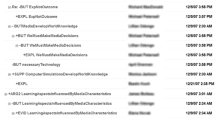Abstract
Because prior beliefs can affect how people argue and respond to controversial claims, in this study we examined how patterns in students’ responses posted in online debates were associated with students’ initial positions on given claims prior to debate. Students that held initial opposing positions to the claim exhibited the tendency to respond to challenges from the opposition with explanations and to respond to explanations from the opposition with challenges. This response pattern was not observed among students with initial supporting and neutral positions. These findings suggest that manipulating group composition based on prior beliefs and manipulating the direction and phrasing of the claim under debate may help to elicit more frequent exchange of opposing viewpoints and raise the level of critical discourse.



Similar content being viewed by others
References
Baker, M. (1999). Argumentation and constructive interaction. In P. Courier & J. E. B. Andriessen (Eds.), Foundations of argumentative text processing (pp. 179–202). Amsterdam: Amsterdam University Press.
Bakhtin, M. (1981). Dialogic imagination. In M. Holquist (Ed.), Trans. Caryl Emerson and Michael Holquist. Austin: University of Texas Press.
Correia, V. (2011). Biases and fallacies: the role of motivated irrationality in fallacious reasoning. Journal of Reasoning and Argumentation, 3(1), 107–127.
Guzdial, M. (1997). Information ecology of collaborations in educational settings: Influence of tool. In R. Hall, N. Miyake, & N. Enyedy (Eds.), Proceedings of computer-supported collaborative learning (pp. 83–90). Toronto: Lawrence Erlbaum Associates.
Hewitt, J. (2005). Toward an understanding of how threads die in asynchronous computer conferences. Journal of the Learning Sciences, 14(4), 567–589.
Jeong, A. (2005). Discussion analysis tool (DAT). Retrieved at http://myweb.fsu.edu/ajeong/dat.
Johnson, D., & Johnson, R. (1992). Creative controversy: Intellectual challenge in the classroom. Edina: Interaction Book company.
Koschmann, T. (1996). Paradigm shifts and instructional technology. In T. Koschmann (Ed.), CSCL: theory and practice of an emerging paradigm (pp. 1–23). Mahwah: Lawrence Erlbaum.
McAlister, S. (2003). Assessing good argumentation. Retrieved April, 10, 2004, from http://iet.open.ac.uk/pp/s.r.mcalister/personal/AssessingGEA.htm.
Mielke, K. (1968). Questioning the questions of ETV research. Educational Broadcasting Review, 2, 6–15
Nickerson, R. S. (1998). Confirmation bias: a ubiquitous phenomenon in many guises. Review of General Psychology, 2(2), 175–220.
Tversky, A., & Kahneman, D. (1974). Judgment under uncertainty: heuristics and biases. Science, 185(4157), 1124–1131.
Wiley, J., & Voss, J. (1999). Constructing arguments from multiple sources: tasks that promote understanding and not just memory for text. Journal of Educational Psychology, 91, 301–311.
Author information
Authors and Affiliations
Corresponding author
Rights and permissions
About this article
Cite this article
Jeong, A., Liu, Z. The Effects of Prior Beliefs on Student Interactions in Online Debates. TechTrends 61, 115–120 (2017). https://doi.org/10.1007/s11528-016-0133-5
Published:
Issue Date:
DOI: https://doi.org/10.1007/s11528-016-0133-5



